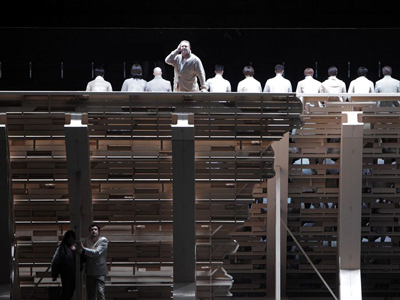by Sedgwick Clark
April 22, 1972, was American composer Elliott Carter’s night to remember, when 2,800 listeners at Carnegie Hall cheered a stupendous performance of his Variations for Orchestra (1955) by Georg Solti and the Chicago Symphony. Solti brought him to the stage and the audience went wild. They were called out by the audience five times, with their faces more aglow with each appearance.
By an amazing coincidence, Lorin Maazel was leading the New York Philharmonic in the Variations at exactly the same time over at Lincoln Center. I caught Monday’s subscription concert, and while it’s iffy to accurately describe the performance qualities of such a complex piece after 40 years, I recall it as being flat as a pancake — as deserving of its tepid audience response as the CSO’s acclamation was two days before. Maazel motioned for Carter to stand in one of the boxes on the left. The audience paid barely any heed, so I shouted “bravo.” The composer turned in my direction, smiled, and bowed, Maazel walked off the stage, and the applause stopped as if sucked into a black hole.
To complete my anecdote, the Chicagoans had originally programmed the Variations in the Boston concert of their East Coast tour, but a standard repertoire work was substituted at the last minute. The Globe’s esteemed music critic and Carter aficionado, Michael Steinberg, was so miffed that he refused to review the concert, sending a stringer instead.
(Postscript, Solti wanted to record Carter’s Variations and couple it with Schoenberg’s Variations for Orchestra, but Decca/London would have none of that, pairing the latter with Elgar’s Enigma Variations.)
Carter’s post-war music was undeniably thorny, but I rarely missed a New York premiere. His early Boulanger-inspired, Coplandesque folk nationalism was not distinguished, and he himself knew that he needed to find his own voice. That happened in his 1950 First String Quartet, as Allan Kozinn noted in his perceptive Times obituary (November 6, 2012). Difficult as his music may have been to grasp at first, it rarely failed to pay dividends on rehearing, especially when Pierre Boulez was conducting.
Carter’s death of natural causes at age 103 on November 5 was not exactly a surprise, but it was unexpected nevertheless. His astonishing Indian summer output and good cheer whenever I saw him and his personal assistant, the clarinetist Virgil Blackwell, at yet another premiere seemed boundless. His last local appearance was at two performances of his Two Controversies and a Conversation last June at Symphony Space for a New York Philharmonic Contact concert. He was in a wheelchair, and his voice quavered a bit when interviewed, but my word what genes he must have had!
According to Zizi Mueller, president of the New York branch of Boosey & Hawkes, Carter’s publisher in his last years, we may look forward to the premieres of American Sublime, for baritone and mixed ensemble, written for James Levine and awaiting the maestro’s first performance, and Epigrams for piano trio, written for another of his champions, pianist Pierre-Laurent Aimard. Also, the American premiere of Dialogues II, written for Daniel Barenboim’s 70th birthday and first performed at La Scala in November by the pianist, with Gustavo Dudamel conducting.
And to think that we named Carter Musical America’s 1993 Composer of the Year soon after he turned 85 because we didn’t want to be too late!

